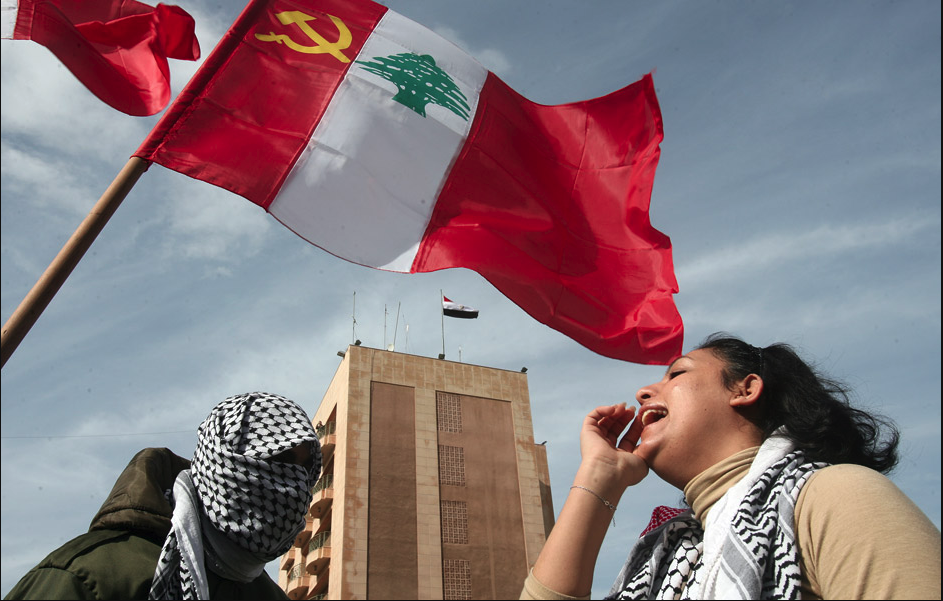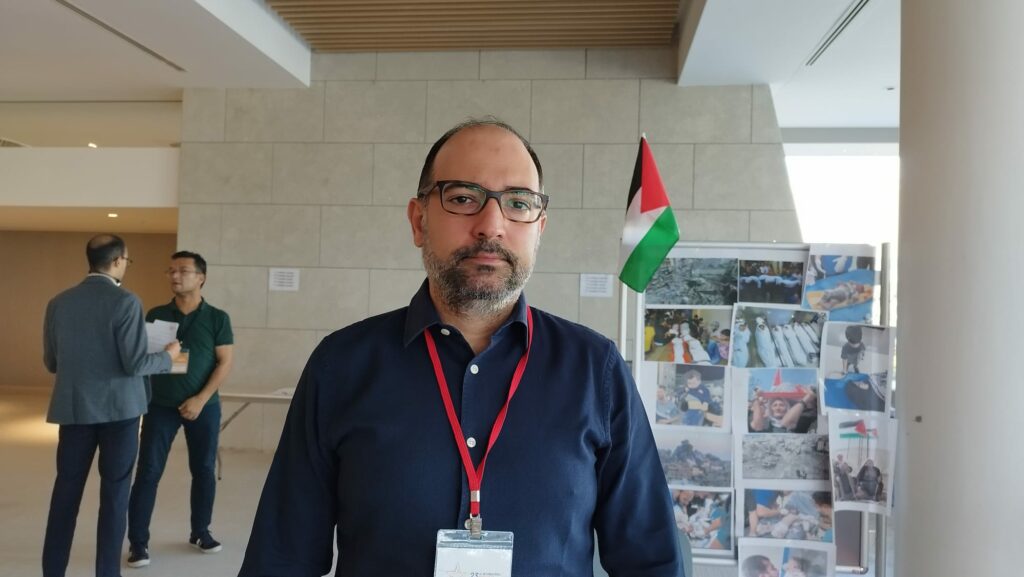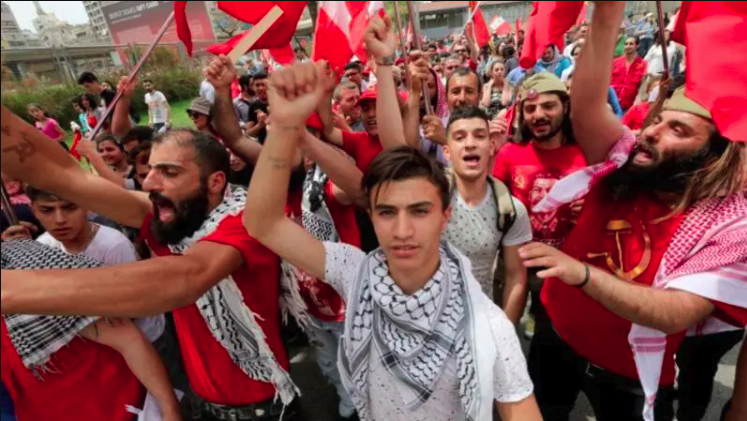
Published 10/26/2023 17:27 | Edited 10/26/2023 17:30
Lebanese Communist Party Organization leader Firas Al-Masry shared a critical analysis of the political and economic situation in Lebanon in an interview given during the 23rd International Meeting of Communist and Workers’ Parties (EIPCO) in Izmir, Turkey. The leader who represents his party in Portugal spoke to journalist Moara Crivelente, who represented the PCdoB International Relations Secretariat in Turkey.
The situation in Lebanon is grim, according to Al-Masry, with a devastated economy and a deeply rooted sectarian political system. He described the rapid deterioration of living conditions in the country, where wages have lost more than 95% of their purchasing power in just three years.
“The political and economic situation in the country is a disaster. Naturally, this is a product of the successive neoliberal policies practiced in Lebanon since 1990, applying all the revenues from the International Monetary Fund, the impositions of the European Union and the United States in terms of economic measures”, he explained to Red Portal.
Read also: Hezbollah, Hamas and Islamic Jihad discuss strategy on conflict in Palestine

Perpetuation of political factions
The political situation in Lebanon is equally problematic, with an electoral system that favors sectarian parties and does not allow for meaningful democratic change. The system of small constituencies makes it difficult for new leaders or parties to emerge. The communist leader highlighted that the Lebanese people are highly politicized, but the results of the last elections showed almost 50% abstention, indicating a disconnect between the political system and the aspirations of the people.
“In political terms, the country is also a disaster because it is a sectarian country, where the political system is designed to measure, or to the size, let’s say, of sectarian parties, with very small constituencies and always reflect the same parties”, he added. .
Al-Masry also warned about foreign interventions, in which the already unstable political situation is further complicated with Israel posing a continued threat of invasion. Furthermore, Lebanon is often the scene of regional disputes and divergent interests, resulting in a volatile and often ineffective political environment. He described Lebanon as politically dictatorial, despite regular elections, due to the system of sectarian constituencies that perpetuate the power of the same parties.
Read also: Economic collapse in Lebanon worsens with fuel and wheat shortages
Contradictory agreements, private interests
Firas Al-Masry explained that the Taife Agreement, designed to end the civil war in 1989-1990, did not effectively address the country’s military and political realities. Although the civil war ended, it failed to provide a lasting political solution. Instead, sectarian leaders ended up benefiting from the agreement, thus perpetuating a dysfunctional political system.
“Instead of applying the Constitution, as the Communist Party has defended since the 1980s, the problem is that we are applying agreements in Lebanon, such as the Taife agreement that was imposed after the civil war, and which had a temporary nature, but passed to permanent. The solution is easy, but there is no will, because these parties that benefit from power don’t want to let the cheese go. They share the cheese among themselves,” he explained.
“Currently there is no government. There is a sitting prime minister, just as there is a sitting president, so the country functions without institutions. This is also a product of the political system, which takes months to try to form a coalition government and does not achieve any results”, he criticizes.
Read also: Journalist dies in Israeli attack on the border with Lebanon
The leader of the Lebanese PC defended the application of Lebanon’s Constitution as a solution to the crisis, highlighting that the country needs comprehensive reform and fairer governance to protect the gains of resistance to the Israeli occupation.
“We, as a country in conflict with the Zionist entity, need to have a coherent and strong political system to protect the gains made through resistance. And the current situation, both economic and political, under these conditions, does not protect these gains, these benefits achieved over the last few years”.
He emphasized the Lebanese Communist Party’s continued commitment to supporting national liberation movements and protecting the country’s borders as well as the Palestinian cause. Al-Masry detailed the ongoing struggle for the return of the bodies of resistance martyrs detained in Israel. He highlighted the importance of the resistance in Lebanon, led mainly by Hezbollah, in the fight against the Israeli occupation. The Lebanese leader emphasized that despite having pushed Israel out of much of Lebanese territory, there are still martyrs whose bodies have been held in Israel for decades. “Just to show here the image of the terrorist state of Israel that even the bodies retain.”
Read also: Lebanon: A tragedy amid crisis, interference and popular struggle
He explained a recent agreement between Lebanon and Israel to resolve maritime border disputes and allow natural gas exploration. He emphasized that this “terrible” agreement was signed under pressure from the United States, taking advantage of Lebanon’s difficult economic situation. According to him, the agreement does not reflect the gains achieved by the resistance, and Lebanon should have obtained more rights based on United Nations guidelines.
Al-Masry explained that Lebanon had more maritime rights along UN lines, but the current agreement does not reflect the country’s interests, a sign of the failure of the Lebanese political system. “Recently, this famous new block, which they awarded to the French two or three days ago, turns out there is no gas in that block. However, the block next door where the Israelis were trying to win and won, has gas. Therefore, a disaster of this political system, of these Lebanese political representatives who are betraying the trust of the Lebanese at all levels”, he criticized.
Another aspect that he drew attention to in this agreement is the contradiction between not recognizing the state of Israel, but making agreements that formally legitimize this recognition. “It’s contradictory. The country as such does not recognize it, but later reaches an agreement to delineate the maritime borders, without any mention of the Lebanese territories still occupied.”
Read also: Lebanon’s crisis goes from bad to worse. But no one is calling

Conflict in Palestine
Following the recent Palestinian resistance operation in Gaza, Lebanon also came into conflict with Israel. The communist leader described a heroic and professional response by the resistance, causing significant losses to the Israeli army. The clash took place within Lebanon’s borders, with casualties on the Israeli side. The leader of the Lebanese Communist Party lamented the lack of international media coverage of these events.
Al-Masry mentioned the murder of journalists and reporters during the clashes. He reported that 21 journalists and reporters have been killed in the region, including in Lebanon, since the fighting began. He highlighted that the deaths of journalists receive little attention from the international media.
The Lebanese resistance, especially Hezbollah, has established two “red lines” for its involvement: the forced displacement of the Palestinian people from their lands and an Israeli ground invasion that threatens the Palestinian resistance. The leader of the Lebanese Communist Party emphasized that the resistance is ready to intervene if these red lines are crossed, believing that this is the time for regional resistance forces to make a difference in support of the Palestinian cause.
At the end of the interview, Al-Masry highlighted the importance of understanding the Palestinian issue as a fundamental question of justice, where a people have been systematically oppressed by a state with disproportionate means of violence.
“I want to give a hug to the Brazilian people, as we have a lot of history in common and it is very important that they know the reality. The Palestinian question is a question of elementary justice, where there is a victim people who have always been massacred and there is another state that used terrorist means to massacre these people, and we cannot compare them. If at a given moment these people rise up to defend their own territory, we can never label them or accuse them of being terrorists. This is unfair, and it is very important that the Brazilian people know this,” he said.
His analysis reveals the complexity of political and military issues in the Middle East region, emphasizing the ongoing quest for justice and the need for international solidarity.
Source: vermelho.org.br

